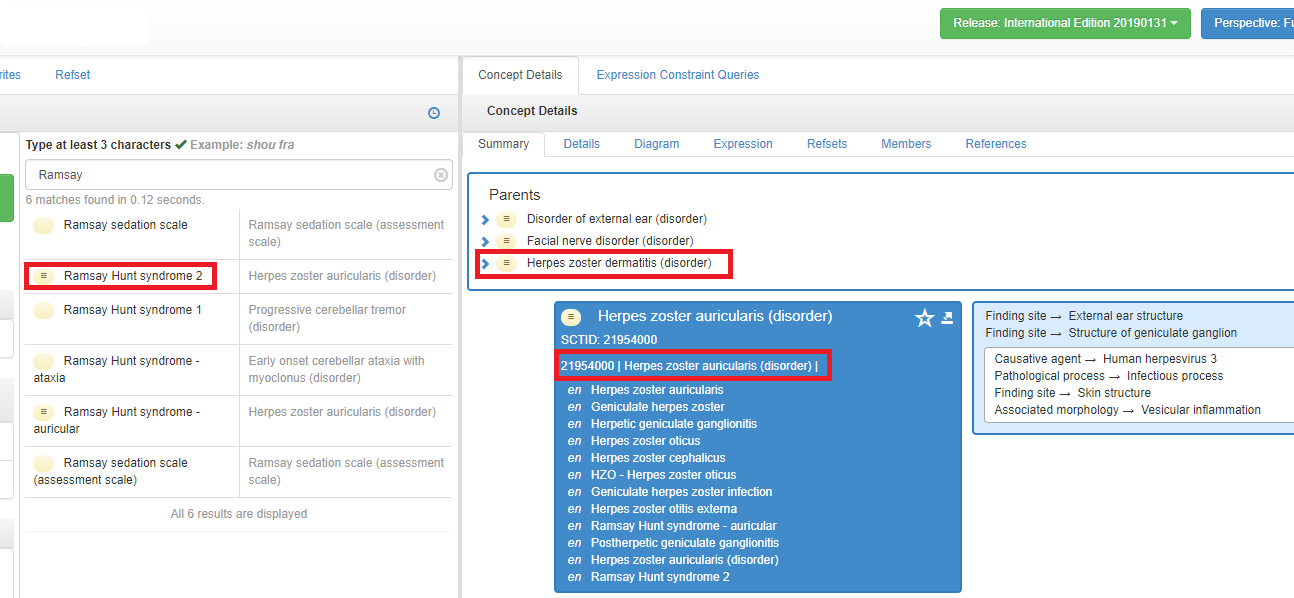Dx Revision Watch
Senior Member (Voting Rights)
An example from ICD-11 of the eponymous name listed under Synonyms to the Fully Specified Name. (The asterisk at the end of "Ramsay-Hunt syndrome" denotes which of the Synonyms terms is the Specified Inclusion to the Fully Specified Name: Geniculate ganglionitis):
ICD-11:
https://icd.who.int/dev11/f/en#/http://id.who.int/icd/entity/305361524
Geniculate ganglionitis
Synonyms
There is also a "Ramsay Hunt cerebellar syndrome" which is a different disorder listed elsewhere in ICD-11.
In SNOMED CT, the cerebellar disorder is listed as "Ramsay Hunt syndrome 1", to distinguish it from Herpes zosta auricularis, which is listed as "Ramsay Hunt syndrome 2".)
SNOMED CT:
Using "Ramsay Hunt" as an example of an eponymous term in SNOMED CT, when searched for within SNOMED CT, a number of SCTID Concept codes will be offered for selection, since "Ramsay Hunt" has been used in association with a number of different disorders and there is also a Ramsay sedation scale.
The terms in grey down the right side of the search engine returns are the terms which are the SNOMED CT "Fully specified name (FSN)" and the designated "Preferred term" for that specific SCTID Concept code. The eponymous term is listed under Synonyms to the FSN.
This screenshot displays the entry for
SCTID 21954000 Herpes zoster auricularis (disorder)
which has "Ramsay Hunt syndrome 2" listed at the end of the Synonyms list:
https://browser.ihtsdotools.org/?pe....org/api/snomed&langRefset=900000000000509007

I hope this example will serve to demonstrate that eponymous terms lack specificity and may result in incorrect terms being entered into electronic medical record systems.
The fact that there are already several terms associated with the name "Ramsay" and "Ramsay Hunt" is incidental. But I have selected "Ramsay Hunt" as an example because it has been necessary to distinguish between two syndromes both associated with the name "Ramsay Hunt" - Progressive cerebellar tremor and Herpes zoster auricularis.
ICD-11:
https://icd.who.int/dev11/f/en#/http://id.who.int/icd/entity/305361524
Geniculate ganglionitis
Synonyms
- Ramsay-Hunt syndrome *
- Ramsay-Hunt disease or syndrome
- Hunt neuralgia
There is also a "Ramsay Hunt cerebellar syndrome" which is a different disorder listed elsewhere in ICD-11.
In SNOMED CT, the cerebellar disorder is listed as "Ramsay Hunt syndrome 1", to distinguish it from Herpes zosta auricularis, which is listed as "Ramsay Hunt syndrome 2".)
SNOMED CT:
Using "Ramsay Hunt" as an example of an eponymous term in SNOMED CT, when searched for within SNOMED CT, a number of SCTID Concept codes will be offered for selection, since "Ramsay Hunt" has been used in association with a number of different disorders and there is also a Ramsay sedation scale.
The terms in grey down the right side of the search engine returns are the terms which are the SNOMED CT "Fully specified name (FSN)" and the designated "Preferred term" for that specific SCTID Concept code. The eponymous term is listed under Synonyms to the FSN.
This screenshot displays the entry for
SCTID 21954000 Herpes zoster auricularis (disorder)
which has "Ramsay Hunt syndrome 2" listed at the end of the Synonyms list:
https://browser.ihtsdotools.org/?pe....org/api/snomed&langRefset=900000000000509007

I hope this example will serve to demonstrate that eponymous terms lack specificity and may result in incorrect terms being entered into electronic medical record systems.
The fact that there are already several terms associated with the name "Ramsay" and "Ramsay Hunt" is incidental. But I have selected "Ramsay Hunt" as an example because it has been necessary to distinguish between two syndromes both associated with the name "Ramsay Hunt" - Progressive cerebellar tremor and Herpes zoster auricularis.
Last edited:
